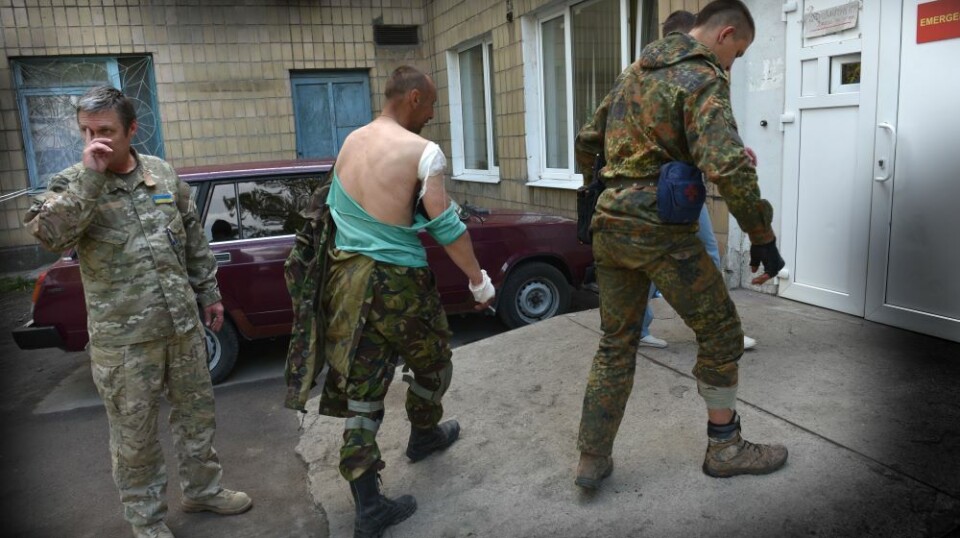THIS CONTENT IS BROUGHT TO YOU BY University of Oslo - read more
Russia's attacks on Ukrainian hospitals:
"We can conclude that the attacks were targeted and not random"
Since the invasion of Ukraine three years ago, hospitals, clinics, pharmacies, and ambulances have been subjected to targeted attacks by Russia, according to a professor. This is a direct violation of the Geneva Conventions.

“Around 60 per cent of the attacks on hospitals, clinics, and other healthcare infrastructure were conducted with precision weapons. From this, we can conclude that the attacks were targeted and not random,” says Scott Gates.
He is a professor of political science at the University of Oslo.
Disregard for the Geneva Conventions and human rights
Gates emphasises that war has always been terrible. What particularly concerns him now is that the Geneva Conventions no longer seem to apply.
Fundamental rights such as the treatment of the wounded, the sick, and prisoners of war, as well as the protection of civilians in conflict, are being set aside.
“Since World War II, most states have adhered to the Geneva Conventions from 1948. However, in recent years, we have seen Russia, Syria, and Israel attack medical facilities. All three countries have ratified the convention, yet commit war crimes on a large scale, which must be stopped,” says Gates.
Gates is a co-author of a study that has not yet been published. The study summarises the extent of attacks on healthcare infrastructure in Ukraine since the Russian invasion on February 24, 2022.
Together with Melanie Sauter from the University of Mannheim, Gates examined data and facts from two larger public datasets: Insecurity Insight and Violent Incident Information provided by the news agency (VIINA).
Systematic attacks in remote areas near the frontline
“We found that the most systematic attacks on healthcare infrastructure occur and have occurred in areas close to the frontline, within a 20-kilometre zone. They do not happen directly at the frontline,” says Gates.
He reports that 73 per cent of the targeted attacks happen in more rural areas.
There have also been large-scale attacks on hospitals and clinics in cities like Kyiv and Kharkiv. Howester, it is more challenging for researchers to conclude that these attacks were targeted.
“In fact, one of the hospitals in Kyiv has been struck over 50 times," says Gates.

However, he adds a caveat. This is because, in urban areas, it is more common for more buildings than those explicitly targeted to be affected.
“Whether the attacks by the Russians are intentional or not is harder to prove in densely populated areas,” Gates clarifies.
Repeated attacks
For researchers to conclude that attacks on medical institutions were intentionally targeted, one of the criteria was that the attacks had to be repeated.
“The fact that 65 per cent of the medical institutions were attacked multiple times was also a factor indicating that there was intentional targeting,” says Gates.
He also refers to video evidence showing drones attacking Ukrainian ambulances, but notes that the Russians have focused on hitting hospitals and larger clinics because it has a greater impact.
Contributing to psychological terror
“In addition to significantly weakening Ukraine's healthcare infrastructure, the targeted attacks induce psychological terror against healthcare personnel and patients. Healthcare personnel become afraid to work, and the injured do not feel safe even when brought to hospitals,” he says.
Gates and Sauter found that the attacks on hospitals and healthcare infrastructure occurred after Russia lost territory – and not, for example, after Ukrainian attacks on Russia or after significant Russian losses.
“This means that the loss of Russian lives appears to be something Russian authorities do not prioritise. It's only the loss of territory that prompts them to attack or punish Ukraine by destroying hospitals and clinics,” says Gates.
The two researchers have mapped the scope of Russian attacks on medical institutions from the beginning of the war until the study was concluded in late 2024.
They found a large degree of overlap between the two datasets. According to Gates, this makes the findings largely unambiguous.
The data, according to Gates, contains 1,821 reports of attacks on healthcare institutions. Of these, 1,179 were repeated attacks.

This content is paid for and presented by the University of Oslo
This content is created by the University of Oslo's communication staff, who use this platform to communicate science and share results from research with the public. The University of Oslo is one of more than 80 owners of ScienceNorway.no. Read more here.
More content from the University of Oslo:
-
Mainland Europe’s largest glacier may be halved by 2100
-
AI makes fake news more credible
-
What do our brains learn from surprises?
-
"A photograph is not automatically either true or false. It's a rhetorical device"
-
Queer opera singers: “I was too feminine, too ‘gay.’ I heard that on opera stages in both Asia and Europe”
-
Putin’s dream of the perfect family




































